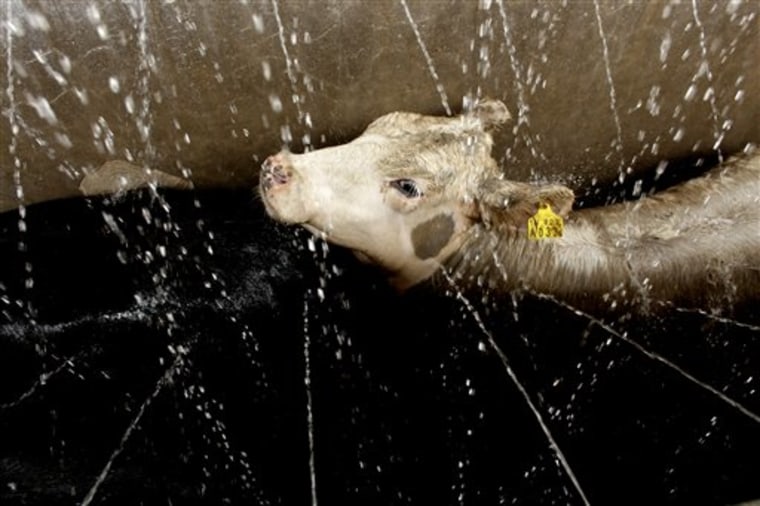Argentina, a nation that prides itself on having more cattle than people, may soon be forced to import beef to keep its meat-loving citizens happy at the dinner table.
Intense government efforts to keep meat affordable through taxes, export restrictions and price controls have enabled Argentines to eat record amounts of beef this year, but the short-term bonanza has come at a very steep cost. With little or no profit left in meat, ranchers are selling out, slaughtering even the female cows needed to maintain their herds.
President Cristina Fernandez, who famously dismissed soy as a "weed," has said her government must protect consumers at a time when booming soy production has taken over 32 million acres (13 million hectares) of grassland once used for ranching.
Her government also has paid huge subsidies for massive feedlot operations where previously grass-fed cattle are fattened on corn and grain.
But it still takes three years from the moment a calf is born for a cut of beef to reach the supermarket, where the price — set weekly by government bureaucrats — is roughly 2 dollars per pound (half kilo), less than the going rate for a pizza that takes minutes to make.
Those low prices have Argentines, already some of the world's biggest beef consumers, practically gorging on steaks. By August of this year, Argentines devoured more than the average body-weight in beef — nearly 165 pounds, the most in 15 years, according to the Chamber of Commerce of the Argentine Meat Industry.
Most Argentines stubbornly reject the idea of replacing beef with chicken, pork or other meats. Despite rich South Atlantic fisheries, seafood is rarely seen on dinner tables, and vegetarians are generally seen as culturally suspect. A typical "parillada," or mixed grill, includes ribs, steaks, sausages and even intestines.
"In my house we eat beef nearly every day," said a typical griller — Maria Gremone, 77, an Argentine-Italian widower. "Every Sunday I roast for my children, grandchildren and anyone else who comes to visit."
Argentina's meat industry slaughtered about 11 million head of cattle during the first eight months of this year, more than any similar period in the past two decades. "It would be great news were it not for the fact that 50 percent of the cattle slaughtered were female," said Miguel Schiariti, the chamber's president.
"By 2011, the shortage will be evident and it will be impossible to continue without importing beef," added Hugo Biolcati, president of the Argentine Rural Society, which called on its 10,000 members — mostly large property owners involved in ranching and farming — to join an anti-government protest in the capital Thursday night.
"You can't work miracles so that more calves are born," Biolcati added. "What is born, is born, and there won't be more."
Agriculture Minister Julian Dominguez welcomed the rally after meeting briefly with Biolcati and other farm leaders Wednesday, saying "it's very good that they express themselves."
"Argentina has an extraordinary agricultural leadership," Dominguez told reporters, but he insisted that "the state can't sit by when there are asymmetries" in the market.
A message left by The Associated Press with ministry officials seeking more detailed comment Thursday was not immediately returned.
The weather hasn't helped: Argentina has suffered the worst drought in 70 years in about a third of its farmbelt, forcing some ranchers to sell off cattle with barely enough meat on their bones to slaughter.
All this adds up to a bleak future for meat lovers: Once beef production fails to meet demand, either prices will rise significantly or fixed-price meat will suffer widespread shortages, and Argentines will either have to consume less or import their beef.
"At this rate we're going to end up having to import beef from our neighbors," said Angel Girardi, president of the Argentine Association of Beef Producers. "Their meat will be sub-par in quality and much more expensive."
At roughly 55 million head, cattle still outnumber the 49 million humans in Argentina, but that will flip in 2011 if current trends continue, according to beef industry consultant Victor Tonelli.
Argentina's stock is expected to have 3 million fewer calves next year — cattle that would have produced 600,000 tons of meat at slaughter.
The agricultural economy is already being hit hard, and that will likely mean less revenue for the government. Even with steep taxes, beef exports totaled 4.4 million tons in 2008, worth $1.5 billion. This year's numbers aren't in yet, but the chamber expects a steep decline in 2010.
To maintain meat supplies, the government has applied not only a 15 percent export tax, but other rules such as a requirement that butcher freezers allocate 60 percent of their cuts for domestic distribution.
The Fernandez administration has repeatedly modified these rules to adapt to market pressures, and the changing landscape has made it difficult for producers to make long-term investments in herds.
Juan Carlos Tolosa, president of the Yaguare Corporation, one of Argentina's 700 butcher freezers, said the number of cows going to slaughter is already declining: His company slaughters only 3,500 cattle a week now, down from 5,000 a few years ago.
"The government must reduce its limits on exports, and not in dribs and drabs," Tolosa said.
